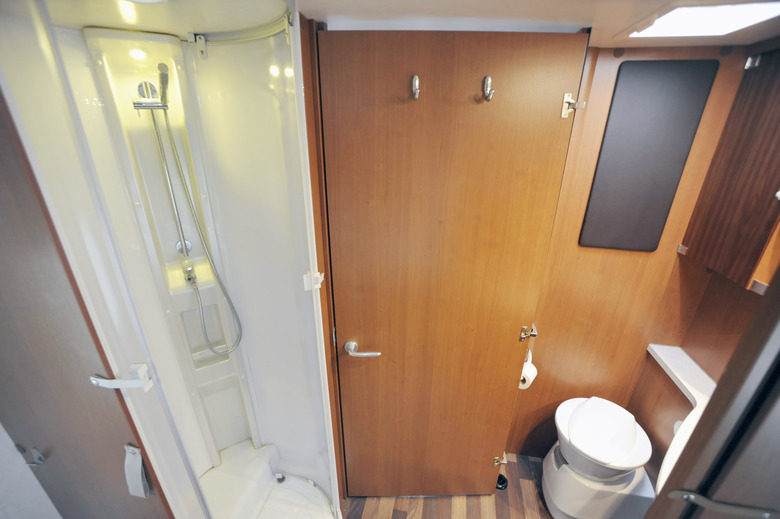How Does A Mobile Home Bathroom Work?
We may receive a commission on purchases made from links.
Mobile home bathrooms work similarly to on-site home bathrooms, but with a few key differences. Like bathrooms in on-site homes, mobile home bathrooms use supply lines to carry the water, drain lines to get rid of waste and ventilation pipes to keep the water in the right places. Where they differ lies mostly in the location and size of the pipes.
Tip
The way a mobile home bathroom works is similar to an on-site home bathroom, with a few key differences.
Codes and Materials
Codes and Materials
Some of the biggest differences between mobile home plumbing systems and site-built, or stick-built home plumbing systems, are their required standards or regulations. Mobile homes ordinarily only have to comply with the U.S. Department of Housing and Urban Development Code, while on-site homes must follow local codes as well.
Mobile homes usually use PEX tubing, which is longer-lasting than copper and sturdier than plastic pipes, which are more susceptible to leaks and other plumbing problems.
Mobile Home Plumbing Basics
Mobile Home Plumbing Basics
In mobile homes, you'll also find that the piping systems are configured differently. In on-site homes, the supply line, which allows water to reach home fixtures, is generally located inside the walls. In a mobile home, the supply line will likely be found beneath the floor. In mobile homes, there may also be a lack of cleanouts and cutoff valves. The cleanout is where the sewer or septic trunk meets the waste drain in the mobile home.
If your mobile home is not connected to a public sewer or septic system, you can discard water into a portable storage tank that you empty at designated dumping stations. Mobile homeowners may also opt for composting toilets, which completely remove the need for blackwater (the water from your toilet) disposal. Whether you can use a composting toilet varies from state to state, however. In the states that allow composting toilets instead of a sewer or septic connection, the toilets are usually required to certified by the NSF, says Greywater Action.
Another key difference between plumbing in mobile homes versus on-site homes? Venting and drainage pipes are smaller and, therefore, can be subject to drainage and venting issues.
Mobile Home Plumbing System Issues
Mobile Home Plumbing System Issues
In fact, there are a few issues you may run into with a mobile home plumbing system. Be wary of strange sounds coming from your walls when the water is draining. This may be a ventilation issue caused by a clogged vent stack, separation of a vent line or a failed auto-vent beneath the sink. As for plumbing leaks, they can be expected to damage the floors — where the pipes are located — rather than the walls. Certain types of wood may soak up the water like a sponge and rot.
Leaks, clogs, low pressure and bad odors are just a few of the problems you might experience living in a mobile home. Oftentimes, it's best to replace the faulty materials altogether than try to fix them.
Mobile Home Tubs and Faucets
Mobile Home Tubs and Faucets
When it comes to sinks, faucets, tubs and toilets, mobile homes are often equipped with fixtures that can easily be replaced. You'll find that mobile home fixtures are also often more compact. Mobile home tubs may be a few inches shorter and narrower than the tubs you might find in an on-site home.
The recommended types of bathtubs for mobile homes are alcove, corner, oval and whirlpool. While standard bathtubs are around 60 x 32 inches, mobile home bathtubs are typically 54 x 27 inches, according to Mobile Home Living. Oval tubs are an exception, with the mobile home version being slightly larger.
There are also a variety of faucets for mobile homes, though the most common is the center-set faucet. Their compact size is ideal for small spaces. Wall-mounted faucets are also growing in popularity, as they don't take up additional room in small spaces.
Normally, mobile homes call for smaller and more compact toilets, sinks and tubs. It's important to find designs that will not only look great but provide the most efficient use of your mobile space.
